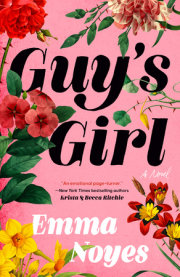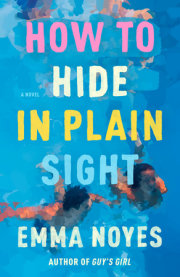PART I
Ginny Murphy is wasting away again.
She can feel it as she drags her suitcase up the fifth and final staircase of her friends' walk-up in SoHo. The tremble in her limbs. The pop of stars at the edge of her vision. It's 6 p.m. and she hasn't eaten a thing all day.
If Heather were here, she wouldn't let Ginny get away with starving herself. She would pull out her phone and find a list of every muscle, every neuron, every organ that needs energy to survive. Then she would force-feed Ginny a donut.
When she reaches apartment 5E, Ginny pauses to straighten her skirt and blink away the lights clogging her vision. She hesitates. Alone in Minnesota, where she lives, hiding her habits is easy. But here, visiting a group of boys who have known her since their freshman year of college?
Not so easy.
She raises one fist and knocks twice.
"There she is!" comes a voice from inside. She hears footsteps, then the door swings inward, revealing a bushel of red hair and a grin so wide it seems to take up the whole doorway. "Ginny fucking Murphy," says her best friend, Clay. Then she's swept up in a frenzy of freckled arms and spun around the hallway. Ginny laughs. She can't remember the last time she heard that sound come out of her mouth.
Clay sets her down and grabs her suitcase. "Welcome to Manhattan."
Adrian Silvas is on his 6 p.m. break. Fifteen minutes to leave Goldman and pick up a coffee from the Gregory's on East 52nd: cold brew, no sugar, a splash of almond milk. A pick-me-up for what's sure to be another long night. It doesn't matter that it's Friday. It doesn't matter that the managing directors left already. Analysts are to stay at their desks until their eyeballs bleed.
Adrian went into investment banking because that's what everyone said he should do. Just like he applied for the scholarship to Harvard because that's what everyone said he should do. Just like he became the vice president of his final club because that's what everyone said he should do.
When he signed with Goldman Sachs, he had no idea what he was in for. How long his hours would be. How mind-numbing the work was. How truly and utterly it would suck the soul out of his body. Now he's a man with more money than he knows what to do with and no time to spend it.
"Eső után köpönyeg," his grandfather would say. After the rain comes the raincoat.
Clay leads Ginny down the short hallway toward the living room. They don't make it more than three feet before she's accosted by a flurry of curly light brown hair and grey cotton.
"Gin-a-vieve!" yells the flurry, crashing into Ginny and squeezing her tight. "You made it!"
"Tristan," Ginny says into her friend's shoulder. "How many times do I have to tell you? My real name is-"
"'West Virginia,'" Tristan sings, releasing Ginny's shoulders and throwing one hand into the air. Clay leans up against his roommate, and together they sing: "'Mountain mama, take me hooo-me, country roads.'"
When they're done, Clay grins down at Ginny. "Bet you missed us."
"I saw you came in on a seven fifty-seven," Tristan says, suddenly serious. "Was it wide-bodied? God, I would give my left arm to be on a sweet, sweet wide-body right now. Did you know it's been over a month since I've been on an airplane? I think I'm going through withdrawal. But I downloaded this app, look at this, and-"
And he was off.
When they met freshman year, Ginny didn't think she would like Tristan; he talks enough to fill three conversations at once, and his favorite topics are finance, finance, and finance. He is obsessed with shorting stocks and would love nothing more than to ruin a small country's economy.
However, he will also say yes to anything, laugh at anyone's jokes, and try any food you put in front of him. He is insatiably curious-and strangely childlike in his obsession with airplanes.
She adores him.
Ginny loves boys. Not in a sexual way; frankly, she hasn't felt attracted to anyone in years. No-what she loves about boys is their company. Male friendships aren't like female friendships, she thinks. They're easier. Free from the drama.
She loves male bodies, too. Their sloppy haircuts and predictable clothing. The strange shape of their calves-thin at the ankle and round in the middle, like telephone poles swollen with last night's rain. The stupid, honest way they make themselves laugh.
But she loves her boys most of all.
Now Tristan chatters eagerly about the flight-tracking app on his phone as he leads Ginny and Clay into the living room.
The boys' SoHo apartment is the quintessential postgrad shithole: creaky floor planks, white wall paint, and a shower that looks like it was built before the fall of the Berlin Wall. Every boy living in this apartment is over six feet tall; Ginny isn't sure how they fold their legs up tight enough to shit on the pint-sized toilet.
"Tristan," says a low, raspy voice from inside the living room, "if I have to hear one more fact about domestic flight patterns, I'm going to throw myself off the fire escape."
Ginny inhales. He's here.
Finch.
She steps into the dim light of the living room, and there he is: Alex Finch, the fourth and final corner of their friend group. Sitting in a low armchair, aux cord plugged into his phone, guitar balanced on his lap. Finch is studying to become an orthopedic surgeon at NYU. He has close-cropped blond hair and a crooked smile. He's completely brilliant and also stupid, in the way that all brilliant men are also stupid.
When Ginny thinks about freshman year, she thinks about Finch. About his hands on her waist, on the hem of her shirt. The feel of the fabric as it peeled over her head. His eyes as he took her in for the first time. She thinks about kissing until her cheeks are red with the burn of his stubble.
Stop, she thinks. Turn it off.
She forces a smile onto her face and steps forward. "Finch. Hi."
"Gin." He sets aside the guitar and stands. In two long strides he's before her. "It's great to see you." He wraps both arms around her and pulls her in for a hug.
Ginny tries not to inhale for fear that his scent will be too familiar.
After untangling herself from Finch's hug-which lasts just a second longer than is appropriate-Ginny walks over to the worn grey couch and sits. Now that all four of them are standing in the small living room, there isn't much space to breathe.
"So." Clay sets her suitcase on the floor beside the television and crosses the two steps that take him into their tiny kitchenette. "Tonight, we're thinking poker and pregame until Adrian gets back, then hit the bars."
Clay is their ringleader. He may not talk the most-that award rests firmly with Tristan-but he holds the most power. He makes plans and leads the charge. Right now, he works for a government consulting firm, but will probably one day be president of the United States. The man could make friends with a houseplant.
"I bet I can get us a table at Tao," Tristan says. "The owner is a personal friend of my father's. Just last year, we visited his house in the Hamptons, and-"
"Shut up, Tristan," say Ginny and Clay in unison. It rolls off the tongue-their old mantra, words they spoke whenever their friend started going on about his father's connections or late-stage capitalism. They flash surprised grins at each other. Clay's teeth are brilliant white beneath his red hair, and the sight is so familiar it nearly cracks Ginny in half.
"So." Clay winks and turns around, opening the small refrigerator in the corner. "How's work, Gin?"
"Oh, you know," she says, shifting on the couch. "It's work."
"But you work for a beer company," Clay says over his shoulder as he rummages around, looking for cold alcohol. "That's epic."
"Right," Ginny says. "But I live in Minnesota."
During the fall of her senior year, Ginny signed with Sofra-Moreno, a global beer conglomerate. When SM started recruiting her, she was a senior in college studying history and literature-proof that your degree means absolutely nothing and you can do whatever the fuck you want after college, provided you're a good enough liar. What? She was going to get paid almost six figures a year to study the history of beer? Absolutely not. She has to at least pretend to contribute to the company's bottom line.
When she signed her contract with Sofra, Ginny was ready for an exciting global career. She imagined visiting breweries around the world. Rubbing elbows with executives. Climbing the ladder. Maybe even getting her Cicerone Certification, becoming a sommelier of beer.
Right up until they placed her in Minnesota.
She was going to say no. She was going to look for another job. But then her classes picked up in earnest, and all Ginny's free time disappeared, and she just sort of fell numbly into her future. Into the path assigned.
"The Twin Cities!" Tristan claps. "You're lucky to live there. Did you know you can fly to a hundred and sixty-three different cities out of MSP? It's one of Delta's primary hubs, and Delta is the best airline in-"
"Tristan." Finch cuts him off before he can really get going.
Tristan and Finch don't get along. It's not that they don't like each other; it's more that they are two sides of the same coin. Both are stocky, both have lopsided grins and curly hair-Finch's short and blond, Tristan's long and light brown-both come from money and attended East Coast private schools where they rowed stroke on the varsity crew team. During freshman year at Harvard, they were often mistaken for brothers. As college wore on, however, the two split, as if in direct reaction to this unwanted comparison. They leaned as far into their differences as they could. It's the same logic behind why neighboring countries are always at war with each other: we despise those who are too similar to us.
For his part, Tristan became the quintessential finance kid: majored in economics, joined Harvard's consulting club, interned at a bank, dressed in button-downs and Sperry's. Kept a close shave and an even closer eye on his portfolio.
Finch, on the other hand, shed as much of his upbringing as he could. He grew out his hair, traded slacks for joggers, and spent all his free time either with his guitar on his lap or in the physics lab with a bag of weed in his backpack.
Ginny looks away from Finch, forcing her mind in a different direction. To the final occupant of Sullivan Street. The absent party: Adrian.
Of all the boys living in apartment 5E, Ginny knows Adrian the least. He was a last-minute addition to the boys' apartment. An outlier. Back in college, in the limited interactions Ginny had with him, he was roughly as friendly as a potted cactus. But if she wants a place to sleep during her visit to New York, she has to put up with him.
Finishing his search in the fridge, Clay pulls out the ingredients for mixed drinks-exactly what Ginny feared he would do. One shot of tequila is 100 calories; 8 ounces of lemonade is 100 more . . .
She stands, crossing the tiny room to crack open a window. Cool air filters into the room. She inhales deeply before walking back to the couch and sitting down.
Clay pours four cups of tequila and lemonade. Finch lights a cigarette and fiddles with the Bluetooth speaker, setting up a playlist of songs for their pregame. Tristan tries unsuccessfully to steal the aux cord from Finch. All the while, they chatter-about work, about sports, about the girls they're seeing. Every time Tristan mentions wide-bodied airplanes, Ginny and Finch throw napkins at him.
Their voices wash over her, and she finds that, for just a brief moment, her anxiety dissipates. It feels good not to be the girl anymore. To just be one of the group. One of the guys.
She inhales, filling her body with cool air and secondhand smoke.
Adrian pushes open the door of 200 West Street, which houses the headquarters of Goldman Sachs, and heads out into the long-since-black night. He can't remember the last time he left while the sun still shone.
By some miracle, he made it out of the office before midnight. This will be his first chance to go out with his roommates in a long time. His roommates and the girl. Ginny.
Adrian didn't know Ginny well in college. He saw her around campus-roller-blading down Plympton Street or dancing on a table with Clay in the Delphic-but he didn't know her. From what Clay tells him, after graduation, she signed with that big beer company and moved to Minnesota. Normally, he couldn't fathom why anyone would want to live there, but right now he hates his life in New York so deeply that living alone in the Midwest sounds like a dream.
He would never move there, of course. If he were to go anywhere, it would be back to Budapest, where he was born.
His phone buzzes in his pocket. He pulls it out. It's his mom, checking in about his week. "Milyen volt a heted?"
"Kiváló," he responds. Excellent.
His weekly lie.
He tucks his phone away and heads for Sullivan Street.
Adrian’s favorite part of the commute is the three blocks he walks down Prince Street. Artists line the block, paintings, jewelry, and woven blankets laid out before them. Tables spill out of restaurants and onto the sidewalk. Diners play footsie under white tablecloths. The scene reminds him of Váci Street. Of Budapest.
His years in Hungary were the happiest he can remember. Though his mother had her own apartment-in which Adrian lived with his older sister, Beatrix-she worked constantly, which meant he mostly lived with his grandparents outside Budapest in a house his grandfather built by hand. There were cherry trees in the backyard and cabbage wraps on the stove. They lived near a slew of Adrian's great-aunts and -uncles, who regularly gathered to celebrate the holiday of some obscure saint. Someone was always too drunk. Someone was always fighting with someone else.
Years later, Adrian would long for those fights.
When Adrian turned eight, his mom put him into English classes. Once a week, he biked to the home of an ancient Hungarian woman and listened to her jabber at him in a language he neither understood nor wanted to understand. He never participated. Never even opened his mouth. Why would he? Everyone in his life spoke Hungarian.
Copyright © 2023 by Emma Noyes. All rights reserved. No part of this excerpt may be reproduced or reprinted without permission in writing from the publisher.







